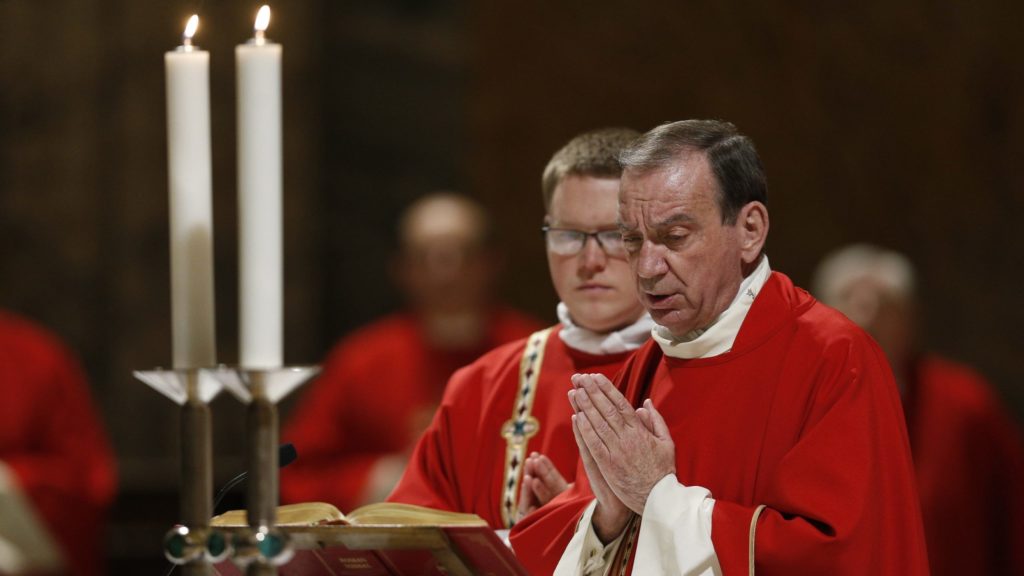Cincinnati Archbishop Dennis M. Schnurr has urged Catholics to reject a Nov. 7 ballot initiative on abortion he called an "extraordinary and dangerous attempt to radically reshape Ohio through a constitutional amendment that does nothing to aid women or promote life."
He said the initiative "would enshrine the 'right' to take the lives of innocent children in the womb while harming women and families in the process."
"An expectant mother of any age can face many challenges, including lack of support from the father, financial strains, concerns about her own health and that of her child, and pressures from family and friends," the archbishop said in an Aug. 12 letter to the faithful of the archdiocese.
"Every woman, regardless of circumstances, should be able to depend upon a community of support," he continued. "That is why Catholic social service agencies, in collaboration with many other faith-based and secular organizations, assist pregnant women in need with material resources and personal accompaniment, both during pregnancy and after their child is born."
Archbishop Schnurr's letter came four days after an Aug. 8 special election when Ohio voters said "no" to a measure that proposed raising the threshold to make changes to the state's constitution from from 50% plus one vote to 60%.
On the measure, known as Issue 1, 57% voted against it, while 43% voted to support it, according to the Ohio Secretary of State's office.
Some pro-life groups supported Issue 1 as they expected its passage would have had a significant impact on the upcoming November ballot measure to enshrine access to abortion in the state constitution.
The November initiative, backed by Ohioans United for Reproductive Rights, would legalize abortion up to the point of viability -- currently estimated within the range of 22 to 24 weeks -- unless a physician decided an abortion after that point was necessary for the sake of the mother's life or health.
Although Ohio lawmakers enacted a six-week abortion ban, that measure is tied up in state court, meaning abortion is currently legal in Ohio up to 22 weeks of pregnancy.
After the Aug. 8 vote, Rhiannon Carnes, spokeswoman for Ohioans United for Reproductive Rights, said in a statement that "now, Ohioans will turn their focus to rejecting extremism and government control to ensure families have the freedom to make decisions that are best for them."
In his letter, Archbishop Schnurr said Ohioans will have the opportunity Nov. 7 "to demonstrate how our state views the sacredness of life and the dignity of women."
The ballot measure does nothing to assist pregnant women in need "both during pregnancy and after their child is born," Archbishop Schnurr said, adding that if enacted, it would also "threaten parental rights."
"The vague language in the amendment opens the door to anyone under 18 having an abortion, or even beginning cross-sex hormone treatment, without parental consent or notification," the archbishop said.
If it passes, Archbishop Schnurr said in his letter, the measure will "allow abortion through 9 months of pregnancy. The amendment provides caveats such that a healthy, fully-formed infant in the womb who otherwise could be delivered with no issues would still be a candidate for a surgical dismemberment abortion."
The language of the initiative says: "Abortion may be prohibited after viability. But in no case may such an abortion be prohibited if in the professional judgment of the pregnant patient's treating physician it is necessary to protect the pregnant patient's life or health."
"Every individual has a right to make and carry out one's own reproductive decisions including but not limited to decisions on contraception, fertility treatment, continuing one's own pregnancy, miscarriage treatment and abortion," it says. The amendment also adds the state cannot interfere with these rights unless it is "using the least restrictive means to advance the individual's health."
"The amendment's supporters will claim that its passage is necessary to preserve medical treatment for women who experience miscarriages or ectopic pregnancies," Archbishop Schnurr said. "This is not true. No Ohio laws -- or the laws of any U.S. state, for that matter -- prevent such treatment. Hospitals, including Catholic hospitals, and physicians have always provided comprehensive miscarriage care, and will continue to do so regardless of the outcome of this vote."
The archbishop added, "The defense of life and care for women compels our participation in this critical moral issue. As Catholics, we are morally obliged to uphold the dignity of life of all vulnerable humans -- immigrants, the poor, preborn children. We cannot remain silent on a direct ballot question like the one in November."
"The church must not remain on the sidelines when confronted with such a clear threat to human life and dignity and the primacy of the family," he said, adding that "Ohio does not need a constitutional amendment that only perpetuates violence and a culture of death."
He urged Catholics "and all people of goodwill to pray earnestly" for the defeat of the amendment, to educate themselves, their families and friends about its dangers and vote "no" to the measure Nov. 7.
"Beyond that," he said, "we must continue our commitment to caring for women, children and families."

